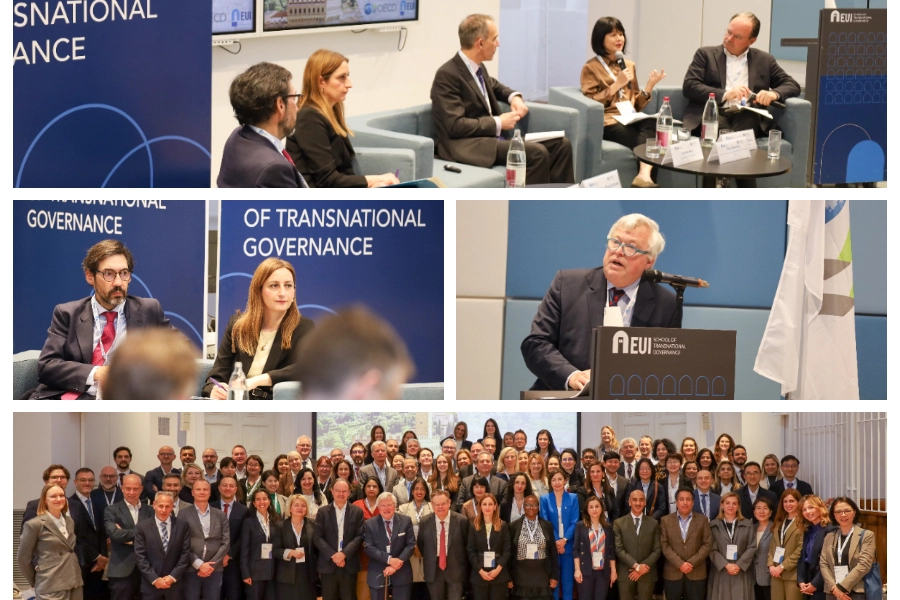
Director Handjiska-Trendafilova at OECD Annual Meeting: Schools of Government Need to be the Change We Want to See in Our Civil Servants
8-9 May 2025, Florence, Italy
The European University Institute's School of Transnational Governance hosted the 2025 Annual Meeting of the OECD Network of Schools of Government, which brought together leading voices from public governance, including deans of schools of government, senior experts, and policymakers, to address the future role of public sector leadership, innovation, and education in governance.
The event commenced with an opening address by Professor Geert Bouckaert, George Papakonstantinou (School of Transnational Governance, EUI) and Jón Blöndal (OECD), who set the tone for discussions on 'Futures for the Public Sector.'
A plenary session on “What Future for Schools of Government?”, moderated by George Papakonstantinou, featured insights from global leaders including Ong Toon Hui (Lee Kuan Yew School of Public Policy), Maja Handjiska-Trendafilova (ReSPA), Andrew Key (UK Cabinet Office), and Manuel Pastor (INAP Spain).
Director Handjiska-Trendafilova views challenges not merely as disruptions but as catalysts for transformation, emphasizing the importance of moving beyond the simple transmission of knowledge: “Instead, we must evolve into dynamic platforms for experimentation, innovation, and co-creation of policies. This evolution demands that we not only teach but also learn continuously—unlearning outdated practices and embracing innovative approaches that foster resilience and adaptability.”
To support this vision, she proposed several key elements: staying abreast of new developments; fostering a culture of collaboration across borders, sectors, and disciplines; understanding the audience and their current and evolving needs; and demonstrating relevance by showcasing tangible results and impact.
“The strategic direction should position Schools not merely as educational institutions, but as incubators of ideas, laboratories for innovation, and engines of change in public administration. The rapid technological transition presents both a tremendous opportunity and a clear call to responsibility. The speed of innovation must be matched by a strong investment in digital competencies, policy readiness, critical thinking, and ethical frameworks,” underlined the ReSPA Director.
Finally, reflecting on ReSPA’s unique role, she highlighted peer exchange as a highly effective and credible learning pathway for developing leadership, communication, change management, digital, analytical, and other essential skills at the regional level. “With our distinct multi-country scope, we contribute to our collective mission—to shape the future in times of turbulence, guided by a commitment to excellence, equity, and ethical governance,” concluded Handjiska-Trendafilova.
Following the panel, participants engaged in facilitated discussions, exploring strategic directions for schools of government under the guidance of Daniel Gerson from OECD.
The first day concluded with a dinner speech by Laura Tyson, Senior Fellow at the School of Transnational Governance, EUI, reflecting on the future landscape of public governance and leadership.
The second day focused on “Tensions at the Top”, examining the dynamics between political and administrative leadership. Rod Glover (Monash University) presented insights on effective governance amidst crises, followed by a panel discussion featuring Michael Bauer (Professor at EUI), Geert van Maanen (Former Secretary-General of the Ministry of Finance in the Netherlands), Evi Dramalioti (Secretary General, Greece), and Taki Sarantakis (Canada School of Public Service).
Breakout groups further explored these themes, moderated by international experts – João Vitor Faria Domingues, (ENAP, Brazil), Anneke Schmider (Australia and New Zealand School of Government), Hugo Cyr (ENAP, Canada) and Patricio Lloret (Latin American Centre for Development Administration)
José Manuel Barroso, former President of the European Commission, delivered a keynote address highlighting global perspectives on governance challenges and opportunities.
The last session “Fostering Innovation for Sustainability” emphasized innovation in policy and service delivery, led by Betânia Lemos (ENAP Brazil), Pipawin Leesamphandh (Thailand OCSC), Christopher Hurst (EUI-STG), and Sílvia Ferreira (INA Portugal), alongside survey insights from Alana Baker (OECD).
Breakout discussions, moderated by experts Fadi Salem, (Dubai MBR School of Government), Agita Kalvina (Latvian School of Public Administration), Angélica Vega Hernandez (Public Administration School, University of Costa Rica) and Naja Vrettakou, (EKDDA, Greece).
The 2025 Annual Meeting of the OECD Network of Schools of Government concluded with a shared commitment to shaping resilient and innovative governance amidst global challenges.



